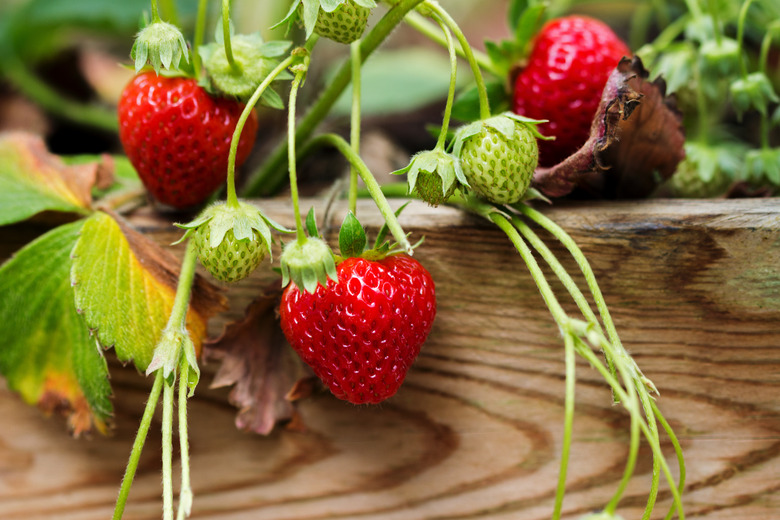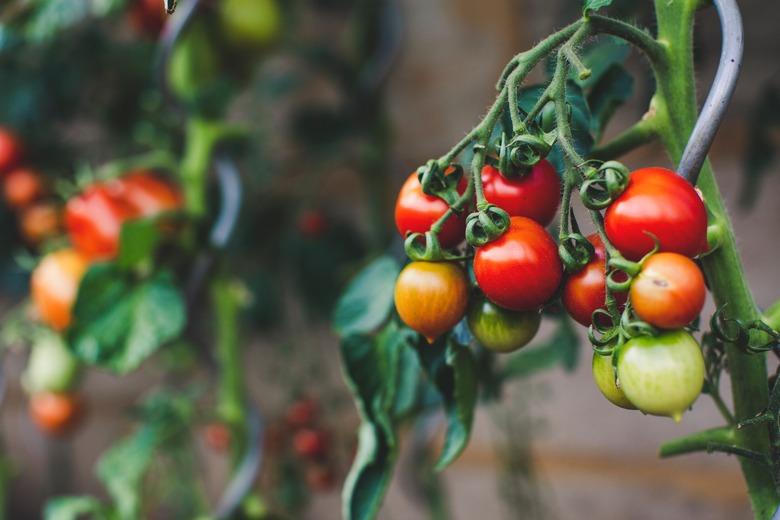Why You Shouldn't Plant Strawberry And Tomato Plants Together
Companion planting takes advantage of the fortuitous combination of plants that complement or help each other by planting them in close proximity. But strawberries (Fragaria × ananassa) and tomatoes (Solanum lycopersicum) are not complementary. In fact, planting them too close together can result in increased disease in both plants.
Tip
Strawberries and tomatoes should not be planted near each other, as both are susceptible to the same fungal diseases.
Why You Should Plant Strawberries Away From Tomatoes
Strawberries and tomatoes are both plants that are susceptible to the serious viral disease verticillium wilt. In fact, all plants from the nightshade family, including potatoes and eggplant, can spread this fungal disease to strawberries if they're planted in the same bed that a nightshade veggie was previously growing.
About Verticillium Wilt
This fungal disease, which targets over 300 plants, is caused by soilborne pathogens that can live in the soil for many years. This disease can cause sudden wilting of foliage and dark spots or dark rings on tissues. If not addressed, it will kill the plant.
The way to combat verticillium wilt is to practice good garden sanitation, removing any affected plants and disposing of them in the trash. Better yet, choose disease-resistant varieties whenever you can.
Differing Growth Requirements
In addition to the possibilities of transmitting diseases to one another, strawberries and tomatoes share very little in terms of their growth patterns, temperature requirements or seasonal harvest timelines.
Tomatoes are annuals that die back in the late fall with the first frost and do not grow back, unless they have self-seeded. Strawberries are perennials that become dormant in the fall but return in the spring when weather warms, although they usually need to be transplanted and renovated every couple of years.
How to Grow Strawberries and Tomatoes in the Same Garden
The fact that these two plants are not actually good companions for each other does not mean that you can't enjoy both of them in your garden. Just plan ahead and make sure that they are planted as far apart as you can get them.
If you are practicing crop rotation, you still need to wait five years to plant strawberries in the same place that tomatoes had been growing.
Companion Plants for Strawberries and Tomatoes
Companion planting benefits both plants by providing something each plant needs. For instance, some flowers help attract pollinators that another plant needs, or one plant might repel pests that are naturally attracted to another plant.
Companion Plants for Strawberries
- **Blue Borage:** Plant blue borage to attract pollinators, which will, in turn, increase your strawberry harvest.
- **Alfalfa:** Plant alfalfa nearby to act as a lure for Lygus bugs, which will keep them away from your strawberries.
- **Onion, Garlic or Chives:** Plant onion, garlic or chives to repel certain pests with their strong odor, in particular the two-spotted spider mite.
Other good companion plants for strawberries include beans, lettuce, spinach and thyme.
Companion Plants for Tomatoes
- **Basil:** Basil is one of the most-often recommended companion plants for tomatoes, because it has a strong odor that can ward off pests and, at the same time, reflect flavors that go well together once harvested. Studies have also shown that basil can reduce thrip populations, as can marigolds.
- **Asparagus and Garlic:** Asparagus can help decrease populations of root-knot nematodes, and garlic repels various pests.
- **Lettuce:** Consider planting lettuce between tomato plants to shade the soil and keep down weeds.

